On July 19th and 20th, over 100 developers bunkered up in Kansas City for the Hack Midwest event (#HackMW). The first time I participated in this hackathon, we all fit in a large room at a country club. This year, to fit the crowd while also providing space for feeding and frisbee, KCITP ( Kansas City IT Professional group) had to move to a college event center.
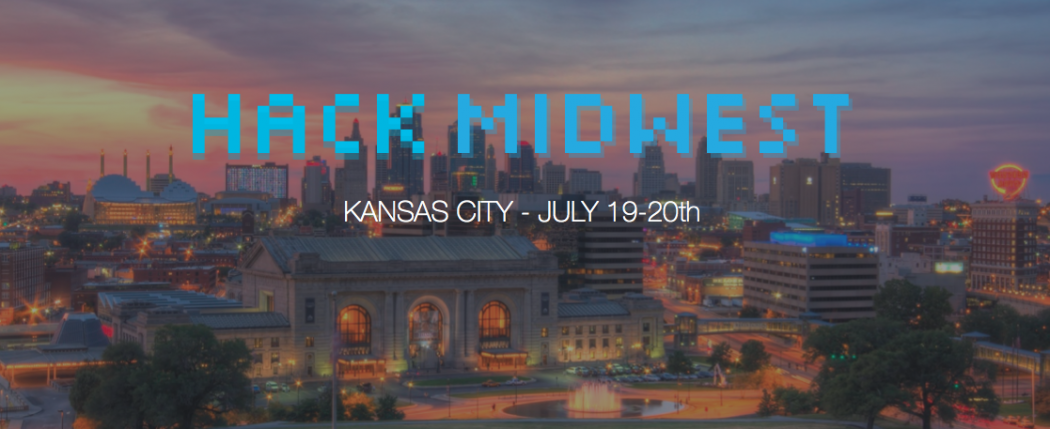
The goal of Hack Midwest is to get a team of techies together and go from zero to demo in 24 hours. I am constantly amazed by what a good team of people rapidly developing in this amount of time can produce, which is part of why I joined Pivotal, a company the preaches this practice. To help incentivize this various sponsors contribute prizes for categories such as Best Design, Most Technically Challenging, Best Student Team App as well as prizes for the use of specific sponsor APIs or platforms. In addition to Pivotal, there was representation from Mashery, Pebble, Rdio, Simplify (Mastercard), Speedycash, Clarify and Sentient Technologies.
There was vast array of skill sets represented at the hackathon, although they were not necessarily evenly distributed. Some teams end up being comprised of mostly of UI designers, while others had solely backend coders. In my time there, I participated in a variety of chats covering topics from Python, C, Erlang, Haskell, Java, and Perl. When it came down to demo time though, the platforms of choice were mainly Ruby on Rails and PHP with lots of Javascript.
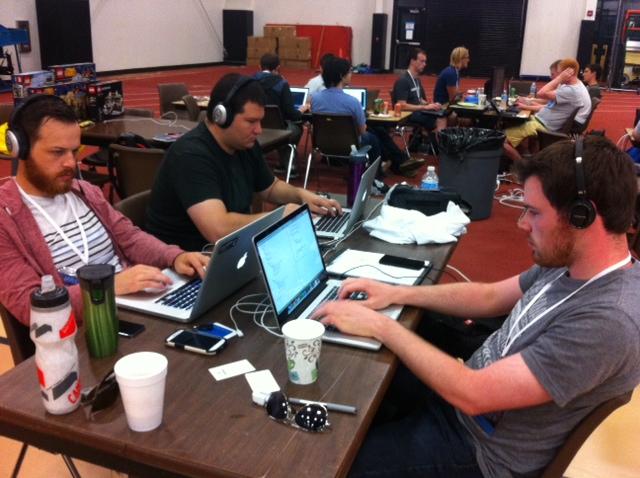
At the start everyone was pretty cheery, but as evening approached people fell seriously in that coding zone—churning out their prototype as long as they could until they sneaked off for a quick cat nap to recharge. One of the toughest facets of the competition is not only coding for 24 hours, but that at the end, you then must present in front of your peers and a panel of judges a demo your application. For a group of people with no sleep, too much caffeine, and who may lean toward introvertedness, it is always impressive that these presentations go amazingly well—complete with everyone cheering at the end.
Well over 20 innovative applications were demoed, including apps such as:
- BlastBB. Using the Unreal engine and the Mashery API to create and interact with objects that represented Best Buy products and subcategories. Not an extremely useful app, but very entertaining.
- Presentation Analytics. This took an audio file of a presentation and parsed it for words to do analytics. This application will help you figure out how many times you repeat words (such as “like”) and the amount of time it takes up.
- College.cat. This site was created to pair tutors and students based on skill sets they are looking for, schedule tutoring time and provide a system for feedback and payments.
At the ends of the event Pivotal gave away two prizes, but I really wish we had given away three.
Best Use of Technology in the Pivotal Stack
One prize was for the ‘Best Use of Technology in the Pivotal Stack’. Developers had the option to use either the version that we offer on network.pivotal.io or the OSS version.
Coder Coupling was the winner with an app that was aimed at helping coders find dates. The idea being that instead of your standard online dating question you use one that are more applicable to the coder lifestyle such as OS of choice and Preferred Programming Language. It will then pair you based on these attributes, “because coding is more than something you do it’s a lifestyle, and you need someone you can share that with”. Once you’ve got a date set up it plugs into a large number of APIs to help you figure out what events are going on you may be interested in and provides conduits to get involved in them. Written using Ruby and PHP they were using the Apache httpd web server to host their app and Redis as the caching mechanism.
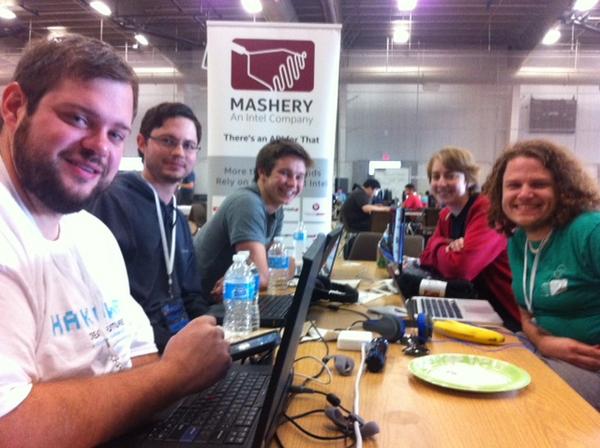
Best App Running on Pivotal Web Services
Another prize was for the ‘Best App Running on Pivotal Web Services’. This prize went to the group that made WishWizard. The app is based around the idea that Amazon wish lists leave a bit to be desired. Personally, I saw its value because I’ve got a bunch of kids that I try to get to make birthday wish lists on Amazon and I like how easy wizards make things—so this is something I’d use. In their app, the user can create a list to which multiple people can add items and favorite or like items, allowing both singular or collaborative wish listing. Under the covers, they were running the Rails and Meteor buildpacks on Pivotal Web Services (PWS) to power the site. To give the app a little personality, they added a very nice “You shall not pass” video for access forbidden errors.
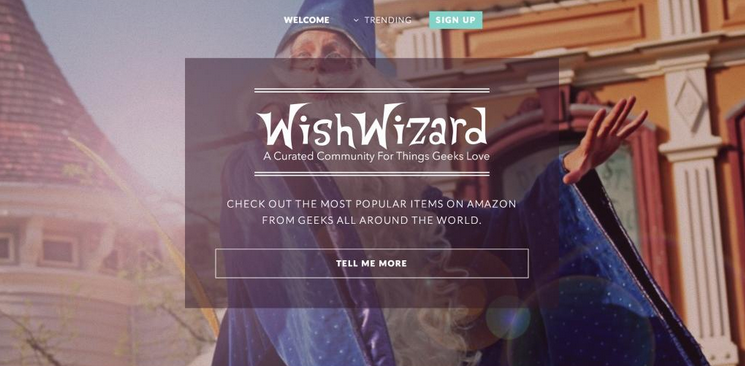
Other Awards
If Pivotal had a third prize to give out, it would have went to the PayFace team. Running on Pivotal Web Services they created an app that mashed together a Pebble watch app, QR codes and the Simplify API from Mastercard. With their system a consumer could create one time payment authorization token. This is manifested as a QR code that can be displayed on any mobile device, such as a Pebble watch in this instance. The token can then be read by a QR apps where the provider is then taken to a site and a transaction is setup. Thus you broker and complete a transaction without pulling out your wallet.
Overall for the event, ‘Best in Show’ went to Drone Analytics. What they demoed was a dashboard showing a breakdown of ethnicity, age and gender which was powered by a video camera on a drone. A very real, practical application of this would be to sweep a crowd to analyze the makeup of its demographics and tailor digital advertising. Or it could be used to simply determine what type of people were attending your event for future planning and reporting. Of course, we tested it out on our crowd at the hackathon, and it picked up that attendees were about 90% male. Hopefully we see more balance to that in the future.
There were a large number of outstanding apps that were displayed and it was tough sorting through the various categories for winners as a judge. In fact, there were no unanimous winners, and several times we had a ties that involved discussion and one more more revotes.
To wrap up, I would encourage anyone who hasn’t attended a hackathon as a sponsor or as a participant to find one near you and go. As a participant, you will push your abilities, meet peers and learn a great deal from those around you. For sponsors, to see what people can do with your API or stack in a short time period and get real world feedback is invaluable. As part of Pivotal, this is what we are about, rapid application development and quick time to delivery—and nothing shows how well this model works than 20 application prototypes coming out of one room in a 24 hour period.
For everyone involved at Hack Midwest, it was truly inspirational to see how well developers are able to harness the power of the Internet of Things, real world interaction and fast data analytics today in an incredibly short time period.
I am definitely looking forward to the next Hack Midwest. I hope to see you there!
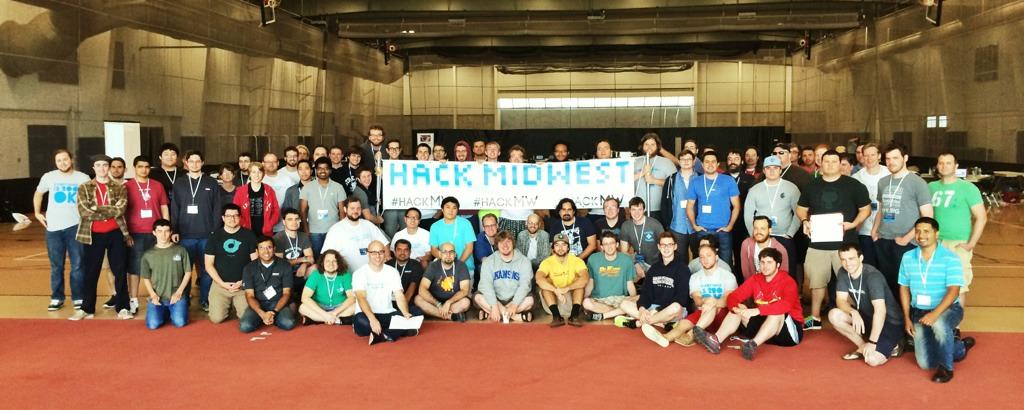
About the Author
























